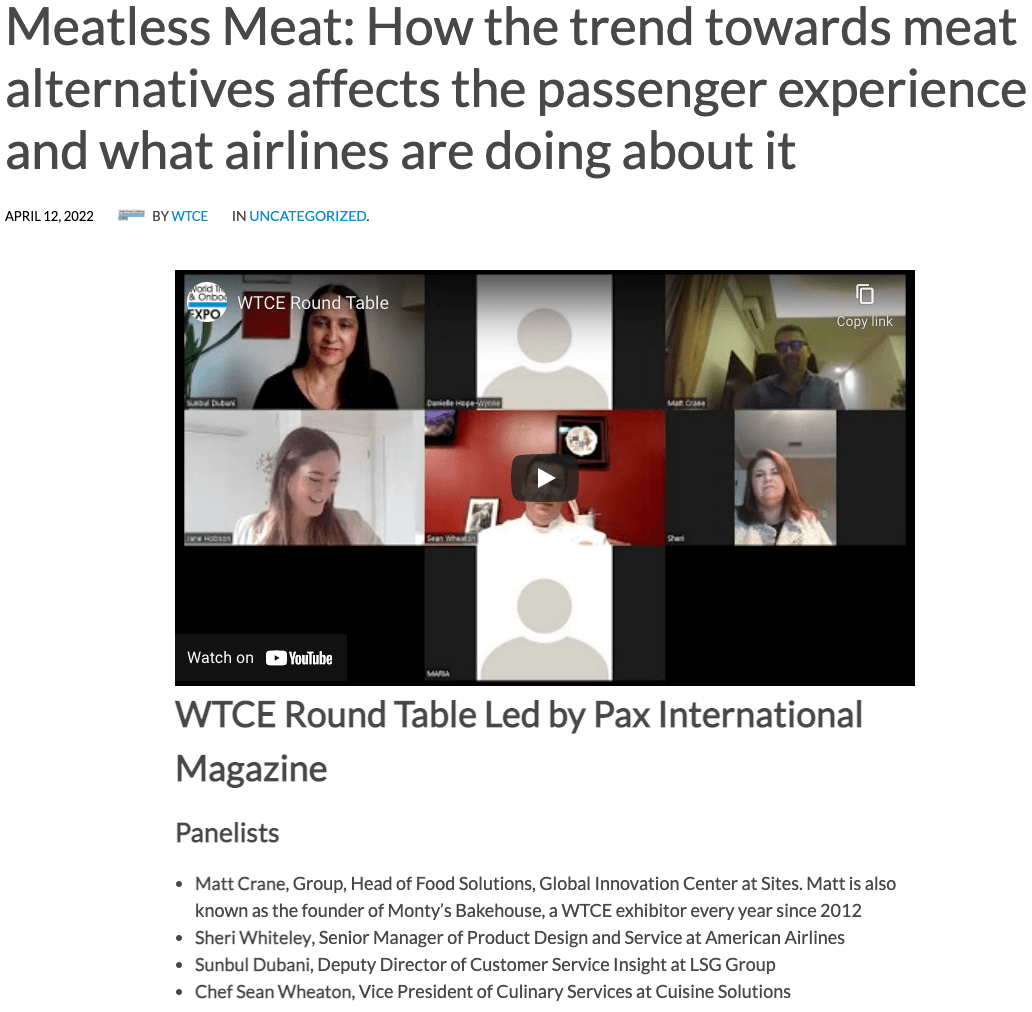Video Clip: WTCE panelists talk trends in meatless meat, moderated by PAX International
Around the world, airlines are highlighting menu changes that include meat alternatives. In this WTCE roundtable discussion in association with PAX International, Editor Jane Hobson speaks with four panelists about the trend toward meat alternatives, how it affects the passenger experience and what airlines are doing about it.
Panelists include Matt Crane, Group Head – Food Solutions Global Innovation Center at SATS; Sheri Whiteley, Senior Manager of Product Design and Service at American Airlines; Sunbul Dubuni, Director Customer Insight at LSG Group, and Chef Sean Wheaton, Vice President of Culinary Service at Cuisine Solutions.
The talk focuses heavily on the growing acceptance of meat alternatives among consumers that closely aligns with these products hitting grocery store shelves and restaurants.
Wheaton discusses efforts by Cuisine Solutions to develop meatless substitutes that can be seasoned and paired with a garnish or sauce. He says there are exciting alternatives in the category that offer one-to-one replacements for meat products, such as egg replacements. The company does extensive work with suppliers to develop the products.
“And our R&D team works really hard to take some of the things you can't pronounce out of their recipes and see if we can clean it up and make it a little bit more natural in some instances,” says Wheaton.
Crane breaks down the main types of meat substitutes: plant based and alternative proteins, cell-based which are grown, and products fermented from biomass. All are intricate processes that can drive up costs – but also present limitless possibilities.

The video is available at the WTCE Hub
“For chefs, this is paradise as you are working with something that is completely new,” Crane says. “And therefore, you have to carefully work out what it can do, and what it cannot do.”
LSG Group has been watching consumer trends and studying what they value in an inflight meal. Dubuni says a huge global trend emerging from the COVID-19 pandemic is consumers’ awareness and adoption of healthier lifestyles. This has given rise to the “flexitarian” consumer that dabbles in both meat alternatives and non. Sustainability is the other focus for consumers, particularly environmental impacts of beef production. It is steering diners toward less damaging products. And, many companies are including environmental information on the label and packaging.
“If we look five years back, we did not see this on the package…now brands are talking about this and not only talking about their owning regions, but also what the impact has on the planet,” she adds.
American Airlines has worked with meat substitutes for some time. Before the pandemic, it offered pasta sauces with alternative meat products. Whiteley says the airline found it had to reassure confused passengers about the makeup of the product that has the texture and taste mimicking meat in Bolognese.
“Our crew on board really had to educate customers about what that item is,” Whiteley says. Interest and knowledge have grown since then she says, however, recognizable vegetarian fare such as black bean dishes have also been popular.
WTCE takes place in Hamburg this summer, June 14 to 16. Follow more in this space in the lead up to the event.

